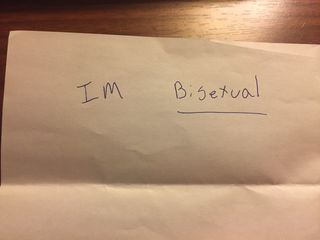Sex
When Straight Parents Are Lost on Queer Sex
A parent’s perspective on navigating sex ed, dating, and health for LGBTQ teens.
Posted November 29, 2018 Reviewed by Abigail Fagan
The following post was co-authored by Sara MacKay, a psychology student at St. Francis Xavier University. All instances written in the first person represent Ms. MacKay's voice and experience.
Shortly after my daughter turned 11, I woke up one morning to find her standing in my bedroom doorway holding a note. She had decided to share an important part of her identity with me by disclosing that she was bisexual. As a parent, I am still proud of this moment.

At 11, thoughts of my daughter’s adolescent years and looming sexual attractions were on the back burner, but right around when she turned 12, she started talking more about her friendships, who had crushes on whom, and she also told me about a girl she liked, Jane.
One day, my daughter asked me about having a sleepover with her friend Jane. Without thinking, I said yes, and then I panicked. Jane’s mom also knew that her daughter was queer-identified, and so when she arrived at my home for drop off, I invited her in for some tea. Pleasantries are fun, but this was happening all too fast, and neither of us felt prepared. We thought we were totally alone in feeling so lost, but as it turns out, our feelings are quite common among the parents of LGBTQ youth.
In June 2018, the article “I Have No Idea What’s Going On Out There": Parents Perspectives On Promoting Sexual Health In Lesbian, Gay, Bisexual, And Transgender Adolescents’ was published in Sexuality Research and Social Policy. True to my own parenting experiences, the article noted the gap in the literature concerning sexual health education for LGBTQ teens. The "birds and the bees" simply doesn’t do in today’s world, filled with young people coming confidently into their sexual and gender identities far earlier than what was often common in past generations.
“The Talk” has never been painted as an easy one for parents to have with their children, but an additional layer of complication is added when a heterosexual parent needs to teach their LGBTQ teen about healthy, safe, and pleasurable (yes, pleasure matters too) sexual experiences that go beyond the standard heteronormative scripts.
The focus of the study, conducted by Michael E. Newcomb and colleagues, was to gather information on (1) parent-adolescent relationships, (2) parent-adolescent communication about sex and dating, and (3) parental knowledge and monitoring of dating and sexual behaviors. The researchers used online focus groups to talk to 44 different parents about their experiences communicating with their LGBTQ adolescents about sexual health and sexual activity. To be eligible, the parents needed to have an LGBTQ adolescent between the ages of 13 and 17.
I found myself reading about my own circumstances in the study. Parents described the relationship they had with their children as good, and most of the relationships got stronger after the disclosure of LGBTQ identity. They also described feeling uncomfortable talking to their kids about sex generally. (Who doesn’t?)
But beyond discomfort, parents of LGBTQ youth disclosed feelings of being unknowledgeable about the sexual experiences of LGBTQ individuals, and concerns that the information they provided would be inaccurate. One mother in the study went on to say that she felt unable to give her gay son any advice on sex because she did not know what sex was like for two men. Many parents attempted to solve this challenge by finding a gay friend or relative to have "the talk" with their child.
Parents also discussed their confusion about monitoring strategies for their teens. Parents expressed concerns about knowing what to do in sleepover situations and how to treat their heterosexual and LGBTQ children equally (if your straight son isn’t allowed to have sleepovers with girls, should your gay daughter be allowed to have sleepovers with girls?). Parents of transgender and cisgender male teens were particularly concerned about protecting their children from predators and expressed a desire to know the people that their children were spending time with or seeking to date.
One third (31 percent) of the parents expressed concerns about safety when it came to online dating sites (noted more by parents of trans teens) and suggested it might be harder to monitor online dating behavior. Experimenting with dating is a normal development and meeting other teens online might make it easier for LGBTQ youth to find each other, especially if they live in places that do not have an abundance of "out" teens within the same age group. At the same time, this opens up new areas of challenge for parents who may not be familiar with online dating apps, and especially ones that target the LGBTQ community.
When asked about whether their monitoring strategies differed upon knowing that their teen identified as LGBTQ, parents said there was no change, and many also reported that they felt monitoring was not yet necessary as their teens were not yet sexually active. Additional research conducted1, however, provides contradictory evidence, suggesting that sexual minority boys frequently do not disclose their sexual interests and experiences to their parents, often out of a fear that their parents would treat those interests differently due to their sexual identity.
When asked what they would want in a Family-Based LGBTQ Teen Health program, the majority of parents (73 percent) expressed a desire for information about sexual health as well as mental health needs (68 percent). Many of the parents expressed a preference for such a program to be delivered in an online format or in a manner that allowed parents to access information separately from their teens, in order to alleviate the awkwardness that might come with a combined parent-teen group-based education program.

This article clearly outlines what I felt after Jane’s mother and I had tea: that there is an overwhelming need for parents of LGBTQ kids to get accurate information about healthy and safe sexual experiences so that we are able to have meaningful conversations. Newcomb and colleagues recognize that parental knowledge of teen sexual activity is a predictor of sexual health and that more family-based programming needs to be in place.
Straight parents of queer kids are feeling lost and sheepish about addressing awkward conversations. I know I am. The research from Newcomb and colleagues acknowledges what some of us are feeling. Now the next step is to go about the business of getting educated so that I am able to present my budding daughter with the best information I can give her to make the most informed choices she can about her relationships and her body.
Are you looking for LGBTQ-inclusive sex education resources? Check out the links below:
References
1 - Feinstein, B. A., Thomann, M., Coventry, R., Macapagal, K., Mustanski, B., & Newcomb, M. E. (2018). Gay and Bisexual Adolescent Boys’ Perspectives on Parent–Adolescent Relationships and Parenting Practices Related to Teen Sex and Dating. Archives of sexual behavior, 47(6), 1825-1837.
Newcomb, M. E., Feinstein, B. A., Matson, M., Macapagal, K., & Mustanski, B. (2018). “I Have No Idea What’s Going On Out There:” Parents’ Perspectives on Promoting Sexual Health in Lesbian, Gay, Bisexual, and Transgender Adolescents. Sexuality Research and Social Policy, 1-12.




